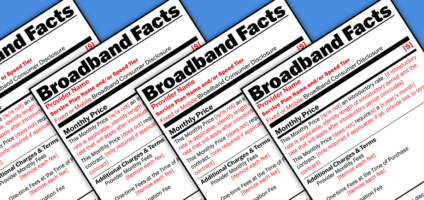
The Federal Communications Commission’s (FCC) new broadband labeling requirement will provide unprecedented transparency to consumers while layering on more complex data reporting for ISPs. With a focus on product and service clarity and consumer empowerment, this mandate is set to revolutionize how Internet Service Providers (ISPs) operate. Starting in early April 2024, ISPs are required to provide clear, accessible, and accurate information about their broadband services in a “nutrition label” format.
While consumers are praising these new changes, the new requirements present a huge compliance burden to ISPs who are receiving or seeking federal funding. Each new price point or service offering must now be registered with the FCC, necessitating a new plan ID. This requirement ties together product offerings, funding, and reporting in a complex web of compliance.
For ISPs, the task of gathering and reporting this detailed information is daunting. The new regulations necessitate robust product management systems, as each service must have its own distinct label, product ID, and comprehensive details, including pricing, introductory rates, data allowances, performance metrics, and participation in the Affordable Connectivity Program (ACP).
The FCC’s product registration process is intricately linked with the ACP and Lifeline service reporting requirements. ISPs aiming to participate in these programs must first register their products with the FCC. This ensures that only eligible products receive ACP and Lifeline funding. The FCC will utilize this data to monitor these programs’ efficacy and reach.
In addition, the monthly reporting and reimbursement processes for ACP and Lifeline programs are also connected to product registration. ISPs must submit monthly reports detailing their ACP and Lifeline subscribers, which the FCC will use for reimbursement calculations.
Rhyan Neble, ETI Software VP, Product Innovation, emphasizes the importance of report automation, given the need to archive data for two years. Real-time data access and a deep understanding of product lifecycles are critical for compliance and competitive advantage. ISPs must now delve into the intricacies of their product offerings, requiring meticulous planning and execution from development to sales.
The larger providers, with over 100,000 customers, must comply by April 10, 2024, while smaller operators have until October 10, 2024. The reporting for those participating in the ACP began on November 9, 2023.
Services like lambda and dark fiber are exempt unless connected to a publicly funded utility service. This exemption also extends to overbuilt fiber funded by the federal government if used for dark fiber services.
Non-compliance could lead to the imposition of hefty fines — and even the loss of the franchise for ISPs. This creates an enormous burden on providers to collect and report data accurately.
The FCC’s new labeling rule is poised to transform the broadband market. It heralds an era of enhanced clarity and transparency for consumers, enabling well-informed decisions. For providers, while it introduces complex challenges in product management, it also opens doors to differentiate themselves by offering more transparent, trustworthy services. As these rules take effect, the spotlight will be on the ISPs’ ability to adapt to a marketplace where integrity in broadband services is not just a choice, but an imperative.
To learn more about the new FCC requirements on labeling, listen to this Broadband Bunch podcast. https://broadbandbunch.com/podcast/provider-challenges-loom-navigating-the-rocky-road-to-fccs-broadband-labels-compliance/